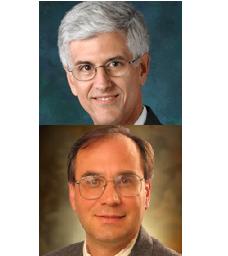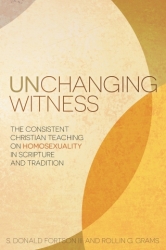With the recent proliferation of books on the subject of homosexuality you may have thought that nothing new is needed, but in this new book historian Don Fortson and New Testament professor Rollin Grams team up to fill an important niche. We’re very pleased to talk to them today about their new work.
Books At a Glance (Fred Zaspel):
Because it has become such an issue in our current cultural climate, we’ve seen many new books on homosexuality. Tell us about the contribution you are trying to make.
Fortson & Grams:
[Fortson] Both of us have a background in mainline churches, and we have been dismayed over how shallow the Protestant discussion on this issue has been since the 70s. As a historian I observed that there had been RC and Orthodox authors who engaged with the texts of the Christian tradition, but on the whole mainline Protestants ignored what believers of earlier generations said about this issue – which is ironic given the fact that the Protestant movement was a retrieval movement – seeking to restore the ancient faith to the Church. Thus, one of the primary aims of our book was to bring church history “out of the closet” for the Protestant debate on homosexuality. [Grams] Many of the books on the market address the cultural, psychological, and pastoral side of the discussion. A number of the books that do engage the Scripture do not do so in much depth, or they fail to engage the Ancient Near Eastern, Jewish, Greek, and Roman contexts in which Scripture was written. A few books on the market do—but very few offer the breadth of primary source quotations that we do. One excellent book that covers the Biblical texts in their historical and cultural context is Robert Gagnon’s The Bible and Homosexuality. We wanted to expand the discussion to the Church through the centuries and give the primary sources a fresh look since when he wrote in 2002. Whoever reads our book will have available a very wide array of primary source quotations—not just references or interpretations—to be able to see whether our interpretations are justified or not.
Books At a Glance:
Explain for us why this has become necessary.
Fortson & Grams:
[Fortson] We believe that several of the mainline churches have approached the precipice of apostasy in their wholesale abandonment of what it has meant historically to be Christian. Endorsing the radical gay agenda, some of these denominations no longer confess the catholic faith of the Church. So some mainline denominations have turned this historic teaching on its head, now celebrating gay sexuality as glorifying to God. Our book is intended as a rebuke to this false teaching, a call to repentance and a warning to believers not to be duped by the fiction that Christianity and homosexual practice are compatible. [Grams] Not a few misinterpretations of the primary sources have crept into the discussion over the last three decades. Interestingly, those interpreting the texts in favor of homosexuality have not come to a unified position; their arguments actually contradict one another. One Presbyterian author in favor of homosexual practice, Jack Rogers, does not even engage an earlier pro-homosexual, Presbyterian author, Robin Scroggs, a couple of decades earlier. The conclusion is upheld even if the arguments are all different!We might call the revisionist reading of Scripture on homosexuality the ‘Great Variety View.’ For example, does Paul oppose homosexual practice because he was really only opposing pederasty, or temple prostitution, or heterosexuals going against their orientation and engaging in homosexual practice?—and on the list of differing arguments goes on the revisionist side.
Another popular view that is patently false is that antiquity did not have the concept of sexual orientation. There are clear answers to these questions, but misinformation abounds by those—including scholars—who simply have not studied the sources. Frankly, the inadequate scholarship, sometimes guided more by the cultural and personal agendas than scholarship, needs to be pointed out to those sincerely still wrestling with these issues.
Books At a Glance:
What is the “Boswell thesis”? How influential is it?
Fortson & Grams:
[Fortson] John Boswell, a gay RC historian wrote an influential book, Christianity, Social Tolerance and Homosexuality, in 1980 which became the “Bible” of the gay Christian movement. Boswell argued that ancient and medieval Christianity tolerated homosexuality, even arguing that he had found evidence of same-sex ceremonies blessing homosexual unions. Of course patristic and medieval scholars hammered him for his distortion of the historic texts, yet parts of the gay Christian movement have continued to herald it as a watershed work exposing the “truth” about homosexuality being compatible with a Christian profession. In the book Boswell also articulated some of the major revisionist biblical arguments that continue to be part of the gay Christian toolbox for re-reading the Bible to make it affirm homosexuality. The arguments that Boswell made 35 years ago still show up in “Christian” gay-affirming books.
Books At a Glance:
Your second chapter is titled, “Church Fathers and a Distinct Christian Life.” Explain your point here for us, and the significance of Christian “tradition.”
Fortson & Grams:
[Fortson] Historically, Christians have always taken biblically defined sexual ethics seriously – in fact, this was a distinguishing mark of believers which set them apart from the pagan population in the early centuries. Sexual relations were exclusively limited to marriage between a man and woman – no premarital sex, no adultery, no prostitutes, and no same-sex lovers allowed. And church discipline for violations was practiced – one sees evidence for this especially in the medieval penitential literature. The concept of “tradition” is fundamental to our existence as believers – this is our family history, the story of how God’s people have interpreted and lived out Holy Scripture since the time of Moses. Tradition should always point back to the Word of God – the faith once for all delivered to the saints.
Books At a Glance:
Aside from the contemporary “Christian gay” agenda has there ever been a time when the Christian church accepted homosexuality as “normal” or condoned it as something less than sinful?
Fortson & Grams:
[Fortson] No, there never has been such a time. Historians do not take Boswell’s thesis seriously. Even gay scholars have acknowledged the dishonesty in his scholarship. Homosexual practice has been affirmed nowhere, never, by no one in the history of the Church. There is no contrary evidence, and this is because the Bible is so crystal clear on the topic. We would argue that if the Bible was at all fuzzy on this topic, we would expect to find some dissenting voices in history, but none exist – which underscores again that there is one voice in Scripture, and one voice in Tradition on this topic. This unanimity is a powerful witness – an unchanging witness to Christianity’s consistent stance on the sinfulness of any form of homosexual practice.
Books At a Glance:
What about during the European Renaissance of the 14th to 16th centuries?
Fortson & Grams:
[Fortson] The Renaissance has garnered much attention from gay scholars as there does appear to be a proliferation of homosexual activity, especially in the Italian commercial republics like Florence. But, here too the civil and ecclesiastical authorities sought to curb the “sin against nature” or what was called the “unmentionable sin” of sodomy. There were Florentine laws that punished repeat homosexual offenders, but rarely were they put to death – contrary to what you sometimes hear. Many crimes received the death penalty in the later medieval/renaissance period, but someone arrested for homosexual practice typically did not receive the death penalty.
Books At a Glance:
Let’s ask the question in broadest scope possible: From the Old Testament to the first-century Jews to the New Testament to the early centuries of the church, the middle ages, the Reformation, and beyond, is there any appreciable difference in the church’s judgment regarding homosexuality.
Fortson & Grams:
[Grams] What we find in the….
Editor’s Note: We will continue this informative interview with Drs. Fortson and Grams here next week. Meanwhile, check out their new book.

